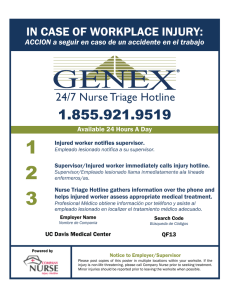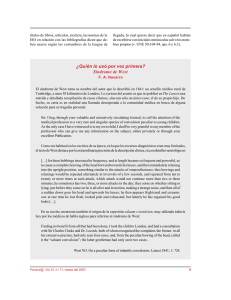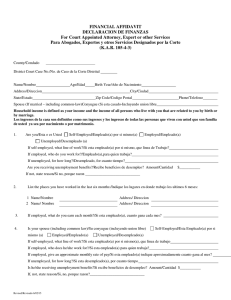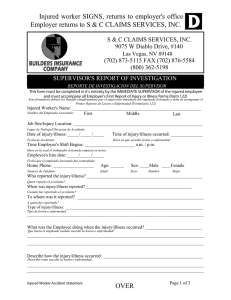C:\Documents and Settings\lgd\Local Settings\Temp\Housing
Anuncio
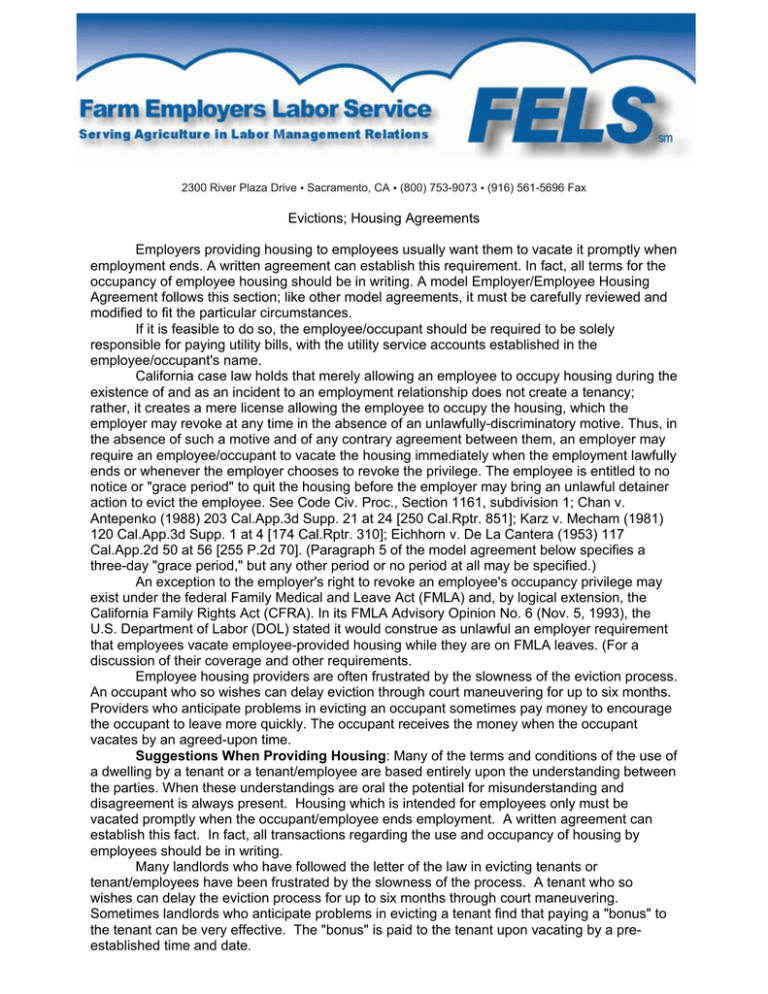
2300 River Plaza Drive Sacramento, CA (800) 753-9073 (916) 561-5696 Fax Evictions; Housing Agreements Employers providing housing to employees usually want them to vacate it promptly when employment ends. A written agreement can establish this requirement. In fact, all terms for the occupancy of employee housing should be in writing. A model Employer/Employee Housing Agreement follows this section; like other model agreements, it must be carefully reviewed and modified to fit the particular circumstances. If it is feasible to do so, the employee/occupant should be required to be solely responsible for paying utility bills, with the utility service accounts established in the employee/occupant's name. California case law holds that merely allowing an employee to occupy housing during the existence of and as an incident to an employment relationship does not create a tenancy; rather, it creates a mere license allowing the employee to occupy the housing, which the employer may revoke at any time in the absence of an unlawfully-discriminatory motive. Thus, in the absence of such a motive and of any contrary agreement between them, an employer may require an employee/occupant to vacate the housing immediately when the employment lawfully ends or whenever the employer chooses to revoke the privilege. The employee is entitled to no notice or "grace period" to quit the housing before the employer may bring an unlawful detainer action to evict the employee. See Code Civ. Proc., Section 1161, subdivision 1; Chan v. Antepenko (1988) 203 Cal.App.3d Supp. 21 at 24 [250 Cal.Rptr. 851]; Karz v. Mecham (1981) 120 Cal.App.3d Supp. 1 at 4 [174 Cal.Rptr. 310]; Eichhorn v. De La Cantera (1953) 117 Cal.App.2d 50 at 56 [255 P.2d 70]. (Paragraph 5 of the model agreement below specifies a three-day "grace period," but any other period or no period at all may be specified.) An exception to the employer's right to revoke an employee's occupancy privilege may exist under the federal Family Medical and Leave Act (FMLA) and, by logical extension, the California Family Rights Act (CFRA). In its FMLA Advisory Opinion No. 6 (Nov. 5, 1993), the U.S. Department of Labor (DOL) stated it would construe as unlawful an employer requirement that employees vacate employee-provided housing while they are on FMLA leaves. (For a discussion of their coverage and other requirements. Employee housing providers are often frustrated by the slowness of the eviction process. An occupant who so wishes can delay eviction through court maneuvering for up to six months. Providers who anticipate problems in evicting an occupant sometimes pay money to encourage the occupant to leave more quickly. The occupant receives the money when the occupant vacates by an agreed-upon time. Suggestions When Providing Housing: Many of the terms and conditions of the use of a dwelling by a tenant or a tenant/employee are based entirely upon the understanding between the parties. When these understandings are oral the potential for misunderstanding and disagreement is always present. Housing which is intended for employees only must be vacated promptly when the occupant/employee ends employment. A written agreement can establish this fact. In fact, all transactions regarding the use and occupancy of housing by employees should be in writing. Many landlords who have followed the letter of the law in evicting tenants or tenant/employees have been frustrated by the slowness of the process. A tenant who so wishes can delay the eviction process for up to six months through court maneuvering. Sometimes landlords who anticipate problems in evicting a tenant find that paying a "bonus" to the tenant can be very effective. The "bonus" is paid to the tenant upon vacating by a preestablished time and date. Farm Employers Labor Service Page 2 If it is feasible to do so, the employee/tenant should be required to be solely responsible for paying utility bills, with the billings and utility services in the employee/tenant's name. This is because the law prohibits a landlord from ordering utilities to disconnect service to premises occupied by a tenant if the tenant refuses to vacate the premises upon termination of his right to occupy them, even if the landlord is paying for them and the service and billings are in the landlord's name. Farm Employers Labor Service Page 3 Sample Forms and Notices The following are samples of forms and notices which may be used when establishing the landlord/tenant relationship and when evicting tenants upon termination of the housing agreement. When completing any of these forms, it is important to name on the forms all adult residents including spouse, children and other known tenants. NOTICE TO QUIT (30-day Notice) To (name of employee/tenant): You are hereby notified that on (date) , your tenancy of the premises of which you hold possession, said premises being: , . will terminate and end and you are requested and required to deliver possession thereof to on said date. (Name of landowner or representative) Dated: (Typed name of landlord/representative) UNLAWFUL DETAINER COMPLAINT An unlawful detainer complaint form can be obtained from a municipal or justice court when filing for such action. Normally an unlawful detainer action is handled by an attorney. NOTICE TO PAY RENT OR QUIT (3-day Notice) To: Notice is hereby given that pursuant to the agreement under which you hold the possession of the hereinafter described premises there is now due, unpaid, and delinquent rent in the following amounts for the following specific period: $ for the period to specified period rent totaling $ to , making the amount now due and payable for the above . Farm Employers Labor Service Page 4 You are further notified that within three (3) days after this notice is served on you, you must pay the amount of said rent in full or quit (move out of) said premises and deliver up possession of the same to the undersigned, who is authorized to receive possession of the same, or the undersigned will institute legal proceedings for unlawful detainer against you to: a) b) c) d) e) recover possession of said premises declare said agreement forfeited recover treble rents and damages plus interest recover attorney's fees pursuant to said agreement recover costs and necessary disbursements You are further notified that such legal action could result in judgment against you for any and all of items (a) through (e), including costs and necessary dis bursements pursuant to Civil Code of Procedures § 1031. You are further notified that by this notice the undersigned does hereby declare a forfeiture of said agreement if said rent is not paid in full within the said three (3) days. Said premises are more particularly and further described as follows: located in Dated: , County of . The Landlord By: Agent Address: Phone: Farm Employers Labor Service Page 5 Sample Employee Housing Agreement By this Agreement entered into this ("Employer") and day of , 200 , ("Employee") agree as follows: 1. Employer shall allow Employee and Employee's immediate family (i.e., spouse and minor children) to occupy the housing located at , California ("the Premises"), subject to the terms and conditions specified below. 2. Employee, as a condition of employment, must reside at the Premises, with the value of the housing to be considered as part of Employee's compensation. 3. Subject to the provisions of paragraph 4 below, Employee and Employee's family may no longer occupy and shall immediately vacate the Premises should any of these events occur: (a) The employer-employee relationship between Employer and Employee ends; (b) Employee becomes unable to perform Employee's duties for Employer, regardless of the reason for or duration of that inability; or (c) Employer, for any or no reason, notifies Employee that Employee may no longer remain on the Premises. 4. Despite the provisions of subparagraph 3(b) above, Employer at its sole discretion may choose to allow Employee to continue to occupy the Premises while Employee is unable to perform Employee's duties for Employer. Should Employer choose to so allow Employee to continue to occupy the Premises, then Employee shall pay to Employer the amount specified in paragraph 5 below until Employee either recommences to perform Employee's duties for Employer or vacates the Premises. Employer may at any time revoke the permission granted to Employee under this paragraph, in which event Employee shall vacate the Premises, subject to the provisions of paragraph 5 below. 5. Should Employee remain on the Premises for more than three days after the occurrence of an event specified in paragraph 3 or in the final sentence of paragraph 4, then Employee shall pay to Employer, as damages and not as rent, commencing with the first day after the event occurred and continuing until Employee vacates the Premises, $ per day, that amount being the reasonable value of the Premises should such an event occur. 6. Employer may change the amount specified in paragraphs 5 above by giving Employee written notice of the change at least 30 days before it is to become effective. 7. Regardless of whether Employee under this Agreement must pay to Employer any amount to be enabled to occupy the Premises, this Agreement neither creates nor shall it be construed as creating a tenancy; rather, it creates and shall be construed as creating a mere license which Employer may revoke at any time. 8. Employer shall maintain in its name the following utility service(s) at the Premises while Employee occupies the Premises: gas propane water electricity garbage. Employer shall pay up to $ per month toward the total charges for these services, and Employee shall reimburse Employer for all charges over that amount. Employee shall be solely responsible for and pay all charges for all other utility services. Farm Employers Labor Service Page 6 9. Employee may modify the Premises only with Employer's prior written consent. 10. Employee shall keep the Premises and its grounds neat and clean. 11. Employee shall allow no other person to occupy the Premises without Employer's prior written consent. 12. Children shall play in designated areas only and at no time around farm equipment or animals. Further, no pets shall be allowed unless prior approval is granted by Employer. 13. Employee, at Employee's expense, shall repair any damage to the Premises caused by Employee's acts or neglect. 14. Vehicles belonging to Employee, Employee's family, or Employee's guests shall be parked in designated areas only. Non-operational vehicles shall not be kept on or about the Premises. 15. Employer and its agents at all reasonable times may enter and inspect the Premises to ensure that Employee is complying with this Agreement. 16. Neither the failure by Employer to insist in any case on the strict performance or observance of any provision of this Agreement, nor the waiver by Employer of a breach of any provision of this Agreement, shall be construed as a relinquishment or continuing waiver by Employer of the provision or as a waiver of any future breach of the same or any other provisions of this Agreement. 17. This Agreement cancels and replaces any prior understanding of the parties on the matters that it covers, represents their entire understanding on those matters, and may be modified only by a writing signed by them. 18. Employee authorizes Employer to deduct from Employee's wages any amount that Employee must pay to Employer under this Agreement. EMPLOYEE EMPLOYER By the signature below, Employee Understands that Employer is supplying housing that has a value of $ per month. Employee agrees that Employer may credit the value of the housing in that amount against employer's minimum wage obligation to Employee. EMPLOYEE EMPLOYER Farm Employers Labor Service Page 7 Acuerdo de Alojamiento Entre Patrón-Empleado Por la presente, con fecha de este día de del año 200 , (Patrón) y (Empleado), acuerdan a lo siguiente: 1. Patrón permitirá a Empleado y familia inmediata del mismo (por ejemplo, cónyuge e hijos menores) a residir en la vivienda localizada en el, , California ("las Propiedades"), de acuerdo a los términos y condiciones que se exponen abajo. 2. El Empleado, como condición de empleo, debe habitar las Propiedades, con el valor de la vivienda que sera considerado como parte del sueldo del Empleado. 3. Expuesto a lo dispuesto en el párrafo 4 de abajo, el Empleado y la familia del mismo no podrán continuar ocupando y deben desocupar inmediatamente las Propiedades, en caso que ocurra alguno de estos eventos: (a) La relación de patrón-empleado entre el Patrón y el Empleado termina. (b) Empleado llegue a inhabilitarse y no pueda desempeñar las tareas de Empleado para el Patrón, sin tomar en cuenta la razón, o duración de esa incapacidad; o (c) El Patrón, por cualquier o por ninguna razón, avisa al Empleado que el Empleado ya no puede continuar ocupando las Propiedades. 4. A pesar de las disposiciones del sub-párrafo 3(b) de arriba, el Patrón a su propia discreción puede optar permitir que el Empleado continúe ocupando las Propiedades, mientras el Empleado se encuentre imposibilitado para desempeñar sus tareas de Empleado para el Patrón. Si el Patrón opta y decide que el Empleado continúe ocupando las Propiedades, entonces el Empleado pagará al Patrón la cantidad especificada en el párrafo 5 de abajo, hasta que el Empleado, ya sea, vuelva a empezar el desempeño de sus tareas como Empleado para el Patrón, o desocupe las Propiedades. El Patrón puede, en cualquier momento, anular el permiso otorgado al Empleado bajo este párrafo, en cuyo caso, el Empleado desocupara las Propiedades, de acuerdo a lo dispuesto en el párrafo 5 de abajo. 5. Si el Empleado permanece en las Propiedades por más de tres días después de haber ocurrido uno de los eventos expuestos en el párrafo 3 de arriba, o en la última oración del párrafo 4, entonces el Empleado pagará al Patrón como daños y no como renta, empezando con el primer día después que haya sucedido el evento y continuando hasta que el Empleado desocupe las Propiedades, $ por día, siendo esa cantidad un valor razonable de las Propiedades, si sucede tal evento. 6. El Patrón puede cambiar la cantidad especificada en el párrafo 5 de arroba entregándole al Empleado un aviso por escrito del cambio por lo menos 30 días antes de que entre en vigencia. 7. Sin tener en cuenta si el Empleado bajo este Contrato debe pagar al Patrón cualquier cantidad para que se le pueda permitir ocupar las Propiedades, este Contrato ni crea, ni podría ser interpretado como que se establece un arrendamiento; más bien, crea y sera traducido simplemente como una licencia, la cual el Patrón puede anular en cualquier momento. 8. El Patrón mantendrá a cuenta propia (bajo su nombre) los siguientes servicio(s) en las Farm Employers Labor Service Page 8 Propiedades, mientras el Empleado se encuentra ocupando las Propiedades: gas; propano; agua; electricidad; basura. El Patrón pagará hasta $ por mes hacia el total de los cargos por estos servicios, y el Empleado reembolsara al Patrón todos los cargos sobre esa cantidad. El Empleado será el único responsable del pago de todos los cargos por otros servicios públicos. 9. El Empleado puede modificar las Propiedades únicamente con el consentimiento previo por escrito del Patrón. 10. El Empleado mantendrá las Propiedad y sus terrenos limpios y en orden. 11. El Empleado no debe permitir que otras personas ocupen las Propiedades sin el consentimiento previo por escrito por parte del Patrón. 12. Los niños jugaran en áreas designadas solamente, y por ningún momento alrededor del equipo de la granja o animales. Además, no se permitirán mascotas a menos que permiso previo sea otorgado por el Patrón. 13. El Empleado, a su propia cuenta, reparará cualquier daño a las Propiedades causado por actos de descuido o negligencia de parte del Empleado. 14. Vehículos que pertenecen al Empleado, familiares del mismo, o invitados del Empleado, serán estacionados en áreas asignadas solamente. Vehículos que no sirven, se mantendrán fuera de las Propiedades. 15. El Patrón y sus agentes, en todo tiempo razonable, pueden entrar e inspeccionar las Propiedades para asegurarse de que el Empleado está cumpliendo con este Contrato. 16. Ni el incumplimiento por parte del Patrón de insistir en cualquier caso, en el desempeño u observación estricta de cualquier disposición de este Contrato, ni el desistimiento por el Patrón de una violación de cualquier disposición de este Contrato, será considerado como una renuncia o anulación continua por parte del Patrón, de la disposición o como una anulación de cualquier violación futura de las mismas o de cualquier otra disposición de este Contrato. 17. Este Contrato cancela y reemplaza cualquier entendimiento previo entre las partes, sobre los asuntos que cubre, representa su completo entendimiento sobre esos asuntos, y pueden ser modificados solamente por un documento escrito y firmado por ellos. 18. El Empleado autoriza a que el Patrón le rebaje del sueldo del Empleado cualquier cantidad que el Empleado tiene que pagar al Patrón bajo este Contrato. EMPLEADO PATRÓN Por la firma debajo, el Empleado entiende que el Patrón le esta proporcionando alojamiento que tiene un valor de $ por mes. El Empleado está de acuerdo que el Patrón puede acreditar el valor de la vivienda en esa cantidad contra la obligación del salario mínimo del Patrón al Empleado. EMPLEADO PATRÓN
